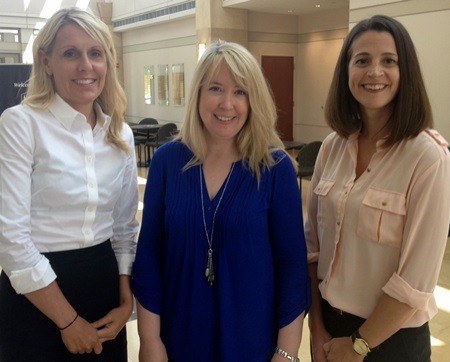Thanks to a $1.1 million grant from the U.S. Department of Education, the next generation of graduates from NIU’s master’s-level School Psychology Program will enter the workforce better equipped to protect vulnerable students from bullying.
Bullying is recognized as a widespread problem in schools. NIU experts say anywhere from 10 percent to 25 percent of children and adolescents are victims of bullying at some point during their school years. Students with disabilities experience bullying at much higher rates than their peers, placing them at even greater risk.
The grant to NIU will support the new Project Prevent and Address Bullying (PPAB) over five years, beginning in January. The project aims to provide about two dozen graduate students studying to become school psychologists with in-depth training emphasizing assessment of bullying issues and intervention and prevention techniques.
 “Collectively, the school psychologists who receive this specialized training will make a difference in the lives of thousands of children over their career,” says professor Christine Malecki, director of NIU’s School Psychology Program and a researcher with expertise on school bullying. “With expert training on the issue, they’ll be equipped to prevent and minimize the negative outcomes associated with bullying, including depression, anxiety, aggression, loneliness, low self-esteem and low academic achievement.”
“Collectively, the school psychologists who receive this specialized training will make a difference in the lives of thousands of children over their career,” says professor Christine Malecki, director of NIU’s School Psychology Program and a researcher with expertise on school bullying. “With expert training on the issue, they’ll be equipped to prevent and minimize the negative outcomes associated with bullying, including depression, anxiety, aggression, loneliness, low self-esteem and low academic achievement.”
School psychologists are in great demand across the country, and NIU’s School Psychology Program is already known nationally for the quality of its graduates at both the master’s and doctoral levels.
The PPAB grant will specifically support students in NIU’s three-year program leading to a master’s degree and specialist-level licensure in school psychology. Malecki believes the training will make graduates of the program even more sought after.
“It certainly is a huge asset to hire a school psychologist who is well-trained to do all of the typical activities of a school psychologist but who also has this unique and specialized training for such a common issue in the schools,” Malecki says.

NIU psychology professors (left to right) Michelle Demaray, Christine Malecki and Julia Ogg will oversee Project Prevent and Address Bullying.
The grant will provide students in the program with funding for tuition, fees, books and travel, plus stipends exceeding $700 a month. Additionally, the students will be eligible for paid half-time teaching assistantships or research posts at NIU.
Local schools stand to benefit, too.
For each student, the first two years of study will include classroom work and hands-on practicum training, including time spent focusing specifically on bullying prevention and intervention at a local middle school. All students also must complete a one-year internship.
Graduates of the program will be equipped to differentiate bullying from typical peer conflict, find root causes, provide interventions and guide students and school faculty on the often complex issues that surround bullying.
Most importantly, they’ll be trained to stop bullying before it happens.
“The most effective school-wide programs are those that prevent the behavior by building positive and supportive school environments,” Malecki says.
Throughout the PPAB program, particular attention will be given to protecting children with special needs.
“Children with disabilities are bullied far more often than other children,” says Michelle Demaray, an NIU professor of psychology who has conducted extensive research on bullying, cyberbullying and the role of bystanders. “Among students with disabilities, 24 percent of grade-schoolers, 34 percent of middle-schoolers and 26 percent of high-schoolers report being bullied. In each instance, the rate is higher than that for students without disabilities.”
 Bullying of any child is problematic, but it is particularly hard on students with special needs.
Bullying of any child is problematic, but it is particularly hard on students with special needs.
“Students with disabilities are more vulnerable,” Malecki says. “Often they have difficulty knowing how to respond or how to seek help. As a result, those students are also more susceptible to negative outcomes from bullying, such as reduced learning or dropping out.”
Malecki and Demaray will be joined by a new member of the psychology department, professor Julia Ogg, in overseeing PPAB.
The research professors have launched a website in progress devoted to the bullying project. In the future, it will include resources designed to assist parents of bullied children and parents of children who bully by providing them with information to help recognize and respond to the issue (also see accompanying video).
The bottom line, say the psychologists, is that there is a need to train professionals who know how to create a climate where students, teachers, administrators and parents are all part of the solution.
“One of our goals is to teach students to recognize that bullying is a complex issue,” Malecki says. “You need well-trained problem-solving experts in your school who can evaluate situations and come up with interventions that incorporate every aspect of a student’s life. This program will create that expertise.”
Students seeking more information about the NIU School Psychology Program can visit its website or contact Christine Malecki at cmalecki@niu.edu.
Tom Parisi, NIU Media and Public Relations

